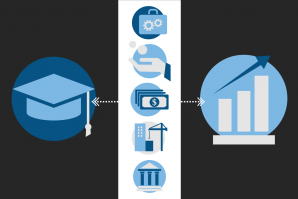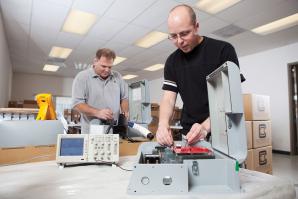The cord powering cleaner, plug-in electric cars in China now stretches across the Pacific to California. A recent information-sharing agreement between UC Davis and the government authority that oversees China’s car industry will connect the world’s acknowledged leaders in creating clean car standards with the globe’s largest and fastest-growing new car market.
The five-year memorandum of understanding, signed in early September in Tianjin, China, establishes the China-U.S. ZEV (zero emission vehicle) Policy Lab on the UC Davis campus. The lab will act as a clearinghouse of information for researchers in both countries studying topics such as the demand for charging stations, driving habits and motorist’s attitudes toward electric vehicles, and technology and policies used in setting anti-pollution standards.
Because of California’s clout as the largest car market in the U.S., the Sacramento region has been a global ground zero for policies, standard-setting and research on automotive environmental issues for decades. The region houses the Fuel Cell Partnership in West Sacramento and the Institute of Transportation Studies at UC Davis.
Gang Li is the department chief in charge of vehicles for China’s National Development and Reform Commission, a government oversight committee. At the signing, he noted that China is at a crossroad, aiming to continue economic expansion while reversing the environmental damage it has caused.
“Given the great importance the Chinese government now attaches to the development and commercialization of new energy vehicles, the establishment of the Policy Lab is very timely,” Li said.
Nearly 12 million new cars are sold each year in China, about 30 percent more than in the U.S. At the same time, China’s rapid industrialization has created serious urban smog problems. The World Bank ranks 16 of the globe’s 20 smoggiest cities in China, which often are blanketed by London-fog like haze. China’s goal is to make one-third of all of those new car sales electric while also expanding the use of solar and wind turbines to generate power.
That fits neatly with ambitions in California, which has called for 1.5 million electric cars on the road by 2025. Through its Air Resources Board, which regulates car, California has been a global leader in setting environmental standards for more than 40 years. The ARB set an international precedent by adopting low emission vehicle standards in 1990. California now purchases 40 percent of all new electric models sold each year in the U.S. and has about 25 percent of the country’s charging stations.
New measures signed into law by Governor Jerry Brown in September allow more plug-in electric vehicles to use carpool lanes, increase tax credits and rebates for low-income buyers, and push for more public charging stations in low-income neighborhoods.
For Dan Sperling, the founding director of the ITS at UC Davis who also sits on the ARB, has high hopes for the arrangement. “This agreement is an important milestone that will promote best practices and policies…to bring new energy vehicles to market not only in China and the United States, but also around the world,” he said.
Sick of missing out? Sign up for our weekly newsletter highlighting our most popular content!
Recommended For You

It’s Impolite to Squat
EV owners find it increasingly difficult to plug in
Long before it was widely accepted, Sacramento attorney Mike Polis bought his first electric vehicle. He got started with a Toyota Prius, later upgraded to a Nissan Leaf and now drives a white Chevy Volt. On average, he saves more than $3,500 a year over his gas-powered counterparts, he can use the HOV lane as a single occupant and he charges his car for free at work.

Growth and Prosperity
UC Davis is the keystone to the Capital Region’s economic success
In civic and business circles, we often hear the lament that Sacramento has never been a corporate headquarters. Many believe this hampers our ability to fully prosper and grow. But, in addition to the attractive traits Sacramento does possess, it has a powerful economic catalyst in its backyard: a top-10 public research university that can be the lifeblood of a stronger, deeper and more resilient regional economy.

Power Brokers
Clean tech thrives in the Capital Region
Beutler Air Conditioning and Plumbing may be a poster-business for the rise and fall — and re-birth — of Sacramento’s economy. Rick Wylie, president of Beutler, says the 65-year-old Sacramento company was probably saved by its diversification, partially into green energy models.



